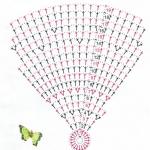By what criteria is a family recognized as having many children? Which families are considered large? State provision of land and housing
Nowadays, not every family decides to have more than one or two children. Children are a luxury. And no matter how you look at it, you need a lot of money to support a child. Let's first figure out what kind of family is considered to have many children?
So, a family with three or more children is called a large family. under 16 summer age. And also, if children study in general education institutions, then they must not be older than 18 years. Moreover, all children are taken into account, even adopted ones.
Some people believe that a large family is wrong. It’s good when there is one, or maximum two, child in a family, then you can fully devote time and attention to their upbringing.
 Indeed, providing for three or more children and giving them all attention requires a lot of effort, patience, and time. However, some parents still manage to do this. It’s nice to watch when children grow up in a family, small or small, when they are beautifully dressed and well-groomed, when the younger one helps the older one...
Indeed, providing for three or more children and giving them all attention requires a lot of effort, patience, and time. However, some parents still manage to do this. It’s nice to watch when children grow up in a family, small or small, when they are beautifully dressed and well-groomed, when the younger one helps the older one...
What are the advantages of a large family?
Each of us wants to leave our own indelible mark in life. Therefore, one can only envy such brave representatives of our society.
Psychologists say that in children In large families, sensitive and responsive people are gradually brought up. Selfishness is completely eradicated, because everyone must take care of each other. Children from an early age are taught to help each other and their parents. After all, parents have very little time to educate and care for their children. And, of course, older children do this.
Benefits for large families
IN modern world Large families have a number of benefits and various support programs from the state. Such programs help increase the birth rate; the government is trying to maintain the level of natural population growth. 
There are a number of benefits for large families. They differ in each region, but not dramatically. First, you need to confirm the status of a large family. After receiving the relevant documents, you can receive the following benefits:

The largest family in Russia
WITH  amaya mother of many children in our country was registered in the 18th century. She had 69 children. It is interesting that she gave birth only 27 times, twins, triplets and quadruplets. This was one of the wives of Fyodor Vasiliev.
amaya mother of many children in our country was registered in the 18th century. She had 69 children. It is interesting that she gave birth only 27 times, twins, triplets and quadruplets. This was one of the wives of Fyodor Vasiliev.
Of course, in those distant times there were simply no modern means of contraception, and abortion was prohibited by religion. And perhaps many will consider this behavior irresponsible. But in Russia, even at the beginning of the 20th century, there was a high birth rate. There were many children in each family. A woman who lived in marriage throughout her childbearing years (which was up to 45 years old) gave birth up to 11 times. Moreover, they were often large births. It was believed that if a family has no children at all, they are sinners.
Naturally, many can say that previously everyone lived in the village, working only for themselves and their families. And now - the level of material well-being does not allow one to have large offspring, instability in the state only aggravates the situation. But everyone’s understanding of wealth is different.
Maybe you should just reconsider your position? After all, nothing bad will happen if you cannot afford annual trips abroad or maintenance of an expensive car. But another baby with your eyes will be born... After all, the proud title of “parent” is not worth any money in the world! With the birth of a child, happiness comes to the family, and if there is a lot of this happiness, is that bad? Even during the war, people gave birth to more than one or two children. Is it really harder for us now than it was then?
Legislation at the federal level does not define what a “large family” is. According to Presidential Decree No. 431 of 1992, the establishment of the criterion for large families is left to the heads of regions. Therefore, the criteria for having many children may vary depending on the specific subject of the Russian Federation.
Typically, a family can be considered to be raising at least three children. This indicator may increase in regions with a more traditional way of life and high population density. For example, in Ingushetia, parents with many children are those who have five or more children. Therefore, in order to say for sure whether a family will receive many children, it is worth contacting legislative framework places of residence.
However, not all children can be classified as members. Such exceptions are:
- children whose parents(partially or completely);
- children who came into the care of the state(were forcibly or voluntarily transferred to orphanages and boarding schools);
- emancipated or entered into a marriage relationship before reaching the age of majority;
- children who were subsequently divided between mother and father(for example, due to divorce, fewer children live with one of the parents, which is required for the status of large families);
- children whose decision has been overturned;
- dead.
To obtain the status of having many children, not only natural children are counted, but also adopted ones. Guardians may also be counted, depending on regional legislation.
Until when can a family have the status of having many children?
In most regions, a family will have many children until the eldest turns eighteen. Another option is until the eldest child turns twenty-three years old, subject to full-time education.
Also, in a number of regions, a family can retain the status of having many children if the child has reached the age of majority and is not undergoing full-time education, but is called up for military service in the army (Oryol region, Jewish Autonomous Region). In such cases, the family does not lose its status until the end conscript service the eldest of the children.
Raising even one child, investing a lot of effort and money in his upbringing and education, is always difficult. Therefore, large families need special care from the state, and therefore norms are established that help the family obtain a special status. Therefore, first of all, it is necessary to determine what kind of family can be considered a large family - how many children should there be in it and what age in order for parents to be able to count on benefits, privileges or rewards that should be provided within the framework of Russia's demographic policy.
Oddly enough, at the federal level, legislation does not establish how many children a family consists of that can be given this special honorary status. Russia is a multinational country and different peoples have their own cultural characteristics. And when for residents of one region three children is so much, then for another, triplets are a completely familiar minimum.
Therefore, the government decided not to introduce a single formulation for the entire country, but to give the regions the authority to set the figure for the criterion for large families independently. This is stated in Decree of the Head of the Government of the Russian Federation No. 431 of May 5, 1992. Therefore, in order to know for sure whether your family can be recognized as having many children, it would be correct to refer to the legislation of the region of your residence.
In most Russian regions, as a rule, the presence of three children allows parents to be considered as having many children. At the same time, for example, in Ingushetia, a family is called large when at least 5 children grow up in it. More recently, in the republics of Mari El and Tyva, such a family had to consist of 4 children, but today this figure has also been reduced to the usual Russian quantitative indicators.
Are all children counted, and when can they be considered adults or independent?
Not all children born to spouses or even those living in the family are taken into account. this moment. Children from a large family, that is, those who are in the status of dependents in the care of their mother and father or one of the parents, are considered:

Children who are voluntarily or forcibly transferred to orphanages or boarding schools or adopted by other families are not family members.
And one more clarification. In some regions, children of a family include those who live in it and are under guardianship (trusteeship). However, for example, for the Moscow region this amendment does not apply; the number of members of a large family includes only natural and officially adopted children.
What system of privileges is provided for this preferential category?
Many bills have undergone changes over the years, and those related to social support privileged categories of citizens.
Large families have the right to count on many benefits that will help them cope with possible financial difficulties in such cases:

There are many pleasant bonuses, such as discounts and free visits to state museums and exhibitions, theaters at least once a month.
In 2015, a mother with many children, by definition in most regions, is raising at least 5 children in her family. Given a decent upbringing, such mothers are entitled early retirement, provided that she raised each of her children until he was 8 years old, and she was already 50 years old.
If there are four to seven or more children in a family, parents are awarded state awards. For those who have seven or more children, this is the Order of Parental Glory, and those who raised, raised or adopted 4-7 children are entitled to a medal of the Order of Parental Glory. Men's and female options medals that are different from each other. The award is accompanied by a cash reward of 100,000 rubles.
 Divorce of spouses undoubtedly raises many questions. But here everything is simple. If a family with three children leaves and, for example, one child remains with the father and two with the mother, the status of a large family is lost. And, obviously, if all children remain with one parent, this status does not change.
Divorce of spouses undoubtedly raises many questions. But here everything is simple. If a family with three children leaves and, for example, one child remains with the father and two with the mother, the status of a large family is lost. And, obviously, if all children remain with one parent, this status does not change.
Spouses with many children have the right to be called again in the event remarriage. Also, if one of the parents officially marries a person who, like himself, has minor children, then adopted children - stepsons and stepdaughters - are counted in the number of children of a family that, according to regional rules, can be recognized as having many children.
Large family in Russia - this status allows you to count on benefits, compensation and allowances determined by regulations. Logically, the concept of a large family should be uniform for the entire country. Agree, it is strange and unfair if, for example, a family in the Volgograd region is recognized as having many children, but a family with the same number of children in the Kaliningrad region will no longer be recognized as such. But, unfortunately, the legislator took exactly this path. How this is possible, and how to understand whether your family belongs to the category of large families, we will try to figure it out in this article.
What kind of family has many children - definition by law
The only regulatory act at the federal level that regulates this issue is Decree of the President of the Russian Federation No. 431 of May 5, 1992 “On measures for social support of large families.” This document underwent a single revision in 2003.
The former head of state granted regional authorities (Governments and executive authorities of the constituent entities of the Russian Federation) the right to independently determine which family in a particular region will be considered large.
So, not a single federal regulation contains the concept of a large family. Therefore, in order to determine whether your family belongs to the category of large families, you need to refer to regional legislation.
Which family is considered to have many children in the regions?
There are 85 constituent entities in our country, and in each of them, officials have defined their own criteria by which a particular family can be classified as having many children. In some regions these criteria coincide, in others, on the contrary, they differ.
The main criteria by which regional acts determine the status of a family as a large family include:
- children's age;
- the circumstances of the child’s appearance in the family (birth, adoption, establishment of guardianship, etc.);
- Cohabitation;
- amount of children;
- presence or absence of Russian citizenship.
Let's consider the definition of a large family using the example of a number of regions - Moscow, Moscow region, St. Petersburg, Leningrad region.
Which family is considered to have many children in the Moscow region?
Regional legislation classifies a family as a large family if the following criteria are present:
- the presence of a registered barque between parents (otherwise the father or mother will be recognized as having many children);
- the presence of three or more children (natural, adopted, stepdaughters and stepsons);
- the age of children should not exceed 18 years (exceeding this age is allowed if the child is studying at educational institution full-time and under 23 years of age);
- cohabitation of children and parents.
The following children are excluded from the number of children to give a family the status of a large family:
- are fully supported by the state;
- recognized as fully capable;
- in respect of which parents are deprived of their rights or have limited rights.
If everything is more or less clear with natural children and adopted children, then with stepsons and stepdaughters not everything is so simple. Unfortunately, the law does not clearly define a stepson and stepdaughter. The Family Code of the Russian Federation contains only an indication of the obligation of these persons to pay alimony to their stepmother or stepfather under certain circumstances. The Civil Code of the Russian Federation mentions the stepdaughter and stepson as seventh-degree heirs. A small clarification is given in Resolution of the Plenum of the Supreme Court of the Russian Federation dated May 29, 2012 No. 9 on inheritance issues. This document states that the stepdaughter and stepson are the children of his spouse who were not adopted by the testator, regardless of their age. Thus, if in a family (if there is a registered barque) the children of one of the spouses live and are raised, not adopted by the second spouse, then for him they will be considered a stepson or stepdaughter.
Not only citizens of the Russian Federation, but also foreign citizens, as well as refugees and stateless persons, if they live in the Moscow region, can apply for the status of a large family.
Briefly about the status of large families in the Moscow region
What kind of large family is there in Moscow?
Please note that to recognize a large family in Moscow, the age of the older children does not matter. It is only important that the youngest child does not reach the age of 16, and when studying at school, 18 years.
It is also worth noting that Moscow Law No. 60 of November 23, 2005 enshrines a provision on confirmation of place of residence - members of a large family can confirm their place of residence with data submitted from state registration authorities (registration in the passport, certificate of residence) .
At the same time, in the Moscow region there is a positive arbitrage practice, which indicates that you can confirm the actual residence of a child in the family (even if he is registered at a different address) with certificates from the place of study, from preschool organization and testimony of witnesses.
Children under guardianship or guardianship cannot be taken into account when calculating the number of children to determine the status of a large family (Appeal ruling of the Moscow City Court dated May 12, 2015 in case No. 33-12914/2015).
Which family is considered to have many children in the Leningrad region?
The issue of assigning the status of a large family in the Leningrad Region is regulated by Regional Law No. 134-oz dated November 17, 2006 “On social support for large and foster families in the Leningrad Region.”
It is worth paying attention to the fact that this regulatory act, when establishing social guarantees for families with children, distinguishes two categories of families that can qualify for benefits - large families and foster families. It is enough for the latter to have three minor children, one of whom will be taken into care under a foster family agreement.
What kind of family has many children in St. Petersburg?
The definition of a large family in St. Petersburg is given in the Law of St. Petersburg No. 728-132 of November 22, 2011 “Social Code of St. Petersburg”.
It is worth noting that this document also defines the concept of the family as a whole - citizens who are the legal representatives of children, and children living with them and leading a common household.
A single-parent family in St. Petersburg is a family raising children (or one child) under 18 years of age. In this case, the only parent (legal representative) has the status of a single father or mother. And the second parent should be:
- deprived parental rights;
- limited parental rights;
- declared missing or dead;
- died;
- does not comply with court documents regarding the collection of child support.
Based this definition families, the St. Petersburg City Court in its Appeal ruling dated December 15, 2014 N 33-19593/14 indicated that members of a large family (children) separately from their parents (legal representatives) cannot be recognized large family.
So, we see that, despite the sufficient territorial proximity between the regions considered and the similarity in national and cultural traditions, the concept of a large family is different in them. Let's look at this with examples.
Example 1. A family raising three children, the eldest of whom is 24 years old, and the youngest is 15 years old. All other things being equal, such a family in Moscow will be recognized as having many children, but in the Moscow region it will no longer be recognized.
Example 2. A family raising three children, one of whom is under guardianship and is not related to this family. All other things being equal, such a family in St. Petersburg will be considered a large family, but in the Leningrad region it will no longer be considered.
Large families belong to the preferential category of citizens who are entitled to certain privileges. Many of the benefits significantly simplify the life of citizens in material terms. However, not only do spouses have three or more children, they also need to additionally obtain the status of a large family.
Which family is considered to have many children?
Russian legislation has a clear definition of which family is considered to have many children. First of all, this is a family with three or more children under 18 years of age.
In this case, not only natural children born in marriage are considered, but also adopted children, stepdaughters and stepsons. That is, for example, if a woman has a child from her first marriage and two children in a new marriage, then the spouses are already considered to have many children.
Important! If one of the three children is 18 years old, then the right to be considered a large family is lost. Moreover, if parents queued up for some program earlier, their place in the queue is reserved for them.
If adult children are studying full-time at a higher educational institution, then until they reach the age of 23, the family retains the status of a large family. That is, all benefits and privileges are preserved in the general manner.
If another child is born or adopted by the spouses, the status of a large family is automatically extended.
The legislative framework
 IN Family Code There is no definition of a large family, but there is a definition of who is considered a child. According to the law, a child is considered a citizen who has not reached the age of majority (18 years). The presidential decree “On measures for social support of large families” also does not fully disclose the meaning of the status, but it does define a list of benefits and privileges.
IN Family Code There is no definition of a large family, but there is a definition of who is considered a child. According to the law, a child is considered a citizen who has not reached the age of majority (18 years). The presidential decree “On measures for social support of large families” also does not fully disclose the meaning of the status, but it does define a list of benefits and privileges.
The only legal act that defines the concept of a large family is the National Standard of the Russian Federation “Social services for the population. Terms and Definitions". According to this document, a large family is one with more than three children.
Download for viewing and printing: Important! Children whose parents have been deprived of parental rights in whole or in part, as well as those who are supported by the state (for example, live in orphanages or boarding schools) cannot be part of the family.
Do you need information on this issue? and our lawyers will contact you shortly.
Regional statistics
According to the presidential decree, the definition of a large family remains at the discretion of regional authorities. The majority adopted the National Standard as a basis, making minor changes.
For example, in Moscow and the region, only children who are under 16 years old are taken into account, and when studying full-time at a higher educational institution - up to 20 years old. In smaller regions - up to 18 and 23 years old, respectively.
Therefore, in order to understand whether a family is classified as having many children in a particular region, you need to contact the Office social protection population at their place of residence or to the local Administration.
Important! Some regions refuse to assign status to those spouses whose children have already reached the age of majority, but are studying full-time at universities. This is not a violation if it is specified in the administrative regulations for social support measures for a privileged category of citizens.
How to get status
 Many citizens are interested in how to obtain the status of a large family.
Many citizens are interested in how to obtain the status of a large family.
To do this, you need to contact the Department of Social Protection of the Population at your place of residence or the Multifunctional Service Center (“My Documents” under the new brand).
When applying, a citizen is not required to pay a state fee; the service for assigning status is provided free of charge.
Documents for assignment
 Since the status is not automatically assigned at the birth of a third or more children, a citizen is obliged to independently contact the department.
Since the status is not automatically assigned at the birth of a third or more children, a citizen is obliged to independently contact the department.
The applicant can be both the mother and father of the children, a guardian or adoptive parent, as well as a representative of the parents on the basis of a written power of attorney.
When applying you must have the following documents:
- birth certificates of all children;
- parents' passports;
- marriage certificate if the parents are married;
- divorce certificate if the parents are divorced;
- a copy of the house register or a certificate of family composition;
- other documents.
Other documents mean any additional documents that are established as mandatory by regional regulations.
Specialists can independently order a certificate of family composition from the MFC. The department does not have the right to demand from the applicant documents that it can request independently through an interdepartmental communication channel.
Important! The right to obtain status may be not only for a “full-fledged married couple”, where there are two parents or guardians, but also for citizens raising children alone.
For example, the grandmother of children whose parents were deprived of parental rights, when appointed as an official guardian, can demand the status of a woman with many children, just like a mother or single father.
Terms of consideration
 Each region has its own deadlines for reviewing a package of documents.
Each region has its own deadlines for reviewing a package of documents.
For example, in the Penza region the maximum term is 14 calendar days, and in Moskovskaya - 30.
During this time, the department checks documents for authenticity, enters information into the unified register of the region or district, and issues a certificate for a large family. The latter is the main document for receiving benefits.
Important! In some regions, a certificate is not issued, so when submitting documents to receive benefits and payments, you must additionally provide copies of the birth certificates of all children each time.
Status validity period
 Each region independently sets the validity period for the status of a large family.
Each region independently sets the validity period for the status of a large family.
Until 2010, in Moscow and the region, confirmation of status was required annually. That is, the parent or guardian was required to contact the Social Security Administration every year to obtain a certificate.
Since 2010, this measure was replaced by the assignment of status until the eldest child reaches 18 years of age, and then 16. In some regions, a certificate is issued once for three or five years, after which it must be replaced.
In the Murmansk region, status is assigned once and until the eldest child reaches 18 years of age.
Important! When receiving a certificate, you must carefully study the document, which should indicate the validity period of the status. If the period is not specified, then by default it is considered that the family loses the right to benefits when the eldest child turns 18 years old.
Basic benefits
 In 2019, spouses with three or more children have an extensive range of benefits and privileges.
In 2019, spouses with three or more children have an extensive range of benefits and privileges.
For example, citizens have the right to
- receiving increased benefits;
- participation in housing programs;
- processing loans and borrowings on favorable terms;
- financial assistance for improving living conditions.
At the same time, to receive all the privileges, it is not enough to simply provide an identification or certificate of status, you must provide full list documents required by the regulations of the department or organization.
For example, when applying for a loan for the purchase or construction of housing on preferential terms, copies of the birth certificates of all children are prerequisite.
Important! In each region, social support measures are established independently by regional authorities. For example, some areas provide a choice between benefits for the purchase of housing or improvements, and some provide both of these benefits.
Dear readers!
We describe typical ways to resolve legal issues, but each case is unique and requires individual legal assistance.
To quickly resolve your problem, we recommend contacting qualified lawyers of our site.






